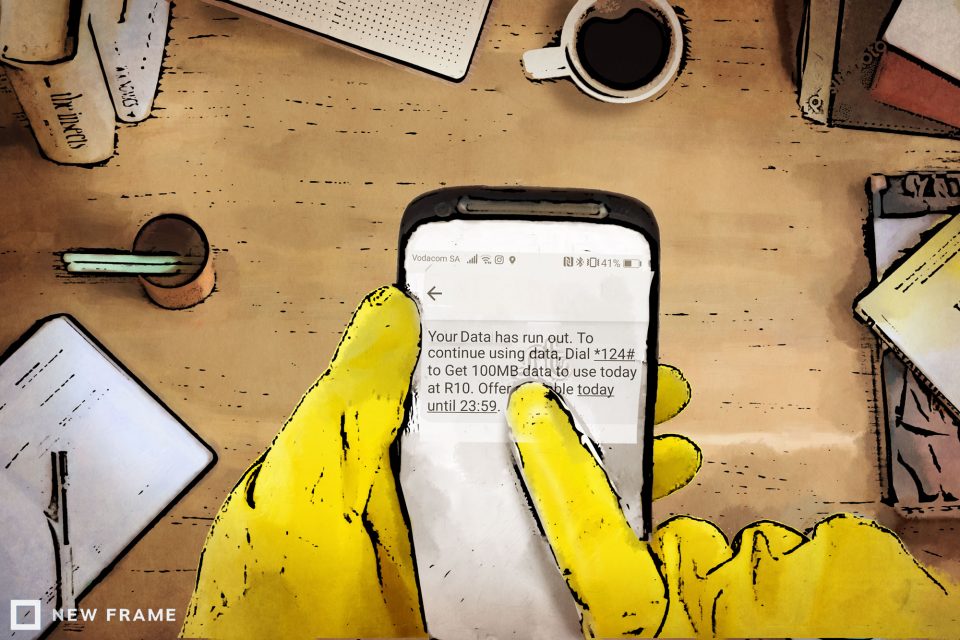As South Africa’s coronavirus infection rates soar, it’s still uncertain when schools and universities will reopen with the country under lockdown until 16 April 2020.
This means that learning at primary, secondary and tertiary levels is going to have to move online. But this development could have dire consequences for the less connected. South Africa is a country of vastly unequal internet access.
“It will be fine for the middle-class kids with fibre connections at home,” said one academic who spoke to New Frame on condition of anonymity. “But students who are at home in rural areas, facing poor connectivity and load shedding will be disadvantaged.”
“The only option we have is to keep the learning going,” said the academic. “But we are going to have to be thoughtful about how we embrace online learning.
“We need a concerted effort to make sure no student is disadvantaged. It is going to be important to keep data costs [low].”
Universities in South Africa are very differently resourced and this is going to affect how effective online learning will be. An academic from a Gauteng university spoke about uploading video and audio files to the university’s website and using Skype and WhatsApp for teaching, while an academic from a regional university said he doesn’t think his university has the capacity for uploading and downloading content.
“Some universities in South Africa are world’s apart from other universities in terms of infrastructure,” said the academic from the regional university, who fears many of his students will suffer in an online learning world.
The issue is not just about data. It is also about mobile connectivity.
“The deep rural areas have very poor mobile coverage and students can only afford limited data,” he said. “This reality makes online learning practically impossible.”
A move to online learning will “exclude a lot of students”.
Corporate South Africa’s responses
The University of the Witwatersrand has announced that it has struck a deal with Vodacom, MTN and Telkom for zero-rating of the university’s e-learning sites in a bid to help keep students connected.
“We are still engaging with Cell C,” said Wits spokesperson Shirona Patel at the time of the announcement.
On 16 March, Telkom announced it was zero-rating over 60 education websites so students could gain access without data.
MTN has since announced plans to do the same for over 100 education websites. The MTN Foundation has also partnered with the Department of Basic Education and the Siyavula Foundation to help Grade 10, 11 and 12 learners to stay on top of their curriculum material over the coming weeks.
“The Siyavula Foundation is already zero-rated for all MTN customers, which means the website can be used with no data costs being incurred,” read an MTN statement. “In addition to this and with immediate effect, the MTN Foundation has sponsored all Grade 10, 11 and 12 students with an amount of R3 million to have full access to the mathematics, CAT and IT and physical sciences learning materials, including practice sheets and exam preparation content.”
“The impact of the Covid-19 virus is far-reaching and affecting all areas of the school, work and life,” said MTN SA Foundation’s Kusile Mtunzi-Hairwadzi. “Our hope is that providing access to this digitised content will go far in supporting learners with their studies and assist with the academic recovery plan of the Department of Basic Education.”
MTN says these learning materials can be accessed free via the Siyavula website or via the app available at the Google store.
Motivation and mental health
Many academics New Frame spoke to said they are also concerned about students motivating themselves to work.
“Most of the students at my university celebrated when classes were suspended,” said one academic.
Another raised concerns that with university campuses closed, students do not have access to mental health services.
“Many students are already battling with anxiety and depression,” said the academic. “Universities provide a safety net for health services, but now the students can’t access these things”.
“They are asking people to work in fear. It’s depressing,” he said. “If some of those students had the coronavirus, sending them home into the rural areas without testing them first could devastate some villages. The university should have rather contained the students in the residences.”
Another academic raised a concern that if the virus is not contained quickly in South Africa, it could mean students don’t graduate at the end of the year and this will have a knock-on effect on the intake levels next year, while also severely disadvantaging students this year.
Data and pay TV
Civil society organisation and black empowerment lobby group Transform RSA (TRSA) has called for consumer relief from data prices during the Covid-19 pandemic.
“An estimated third of South Africans with smartphones cannot afford data to use the internet. We are in effect condemning the poor to have great devices that do not serve,” said a TRSA statement.
“We call on all mobile operators to freeze data costs and offer free data for the remaining month of March until May 2020 until the pandemic has been declared no longer a national emergency.”
South Africa’s broadcast and telecoms regulator, the Independent Communications Authority of South Africa (Icasa) has asked mobile operators and pay-tv services to give people free satellite TV channels and free data to help during this crisis.
This news was Culled from New Frame. Click here to view more.

